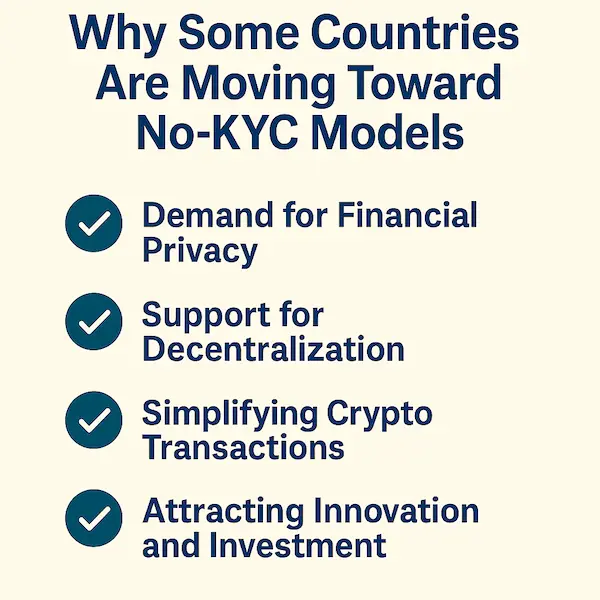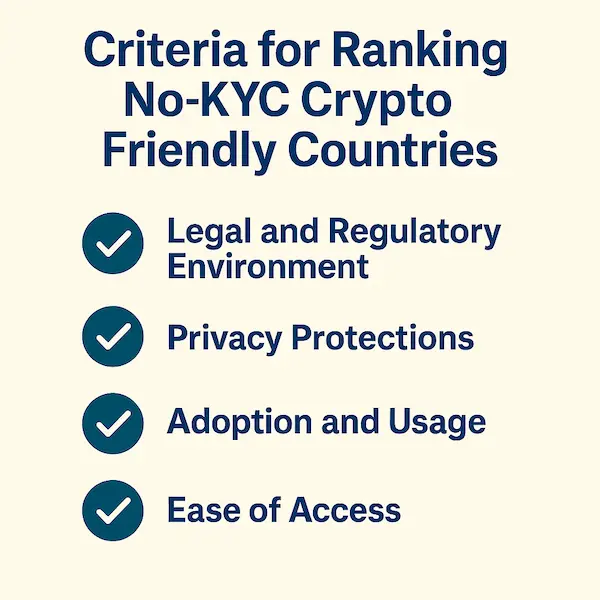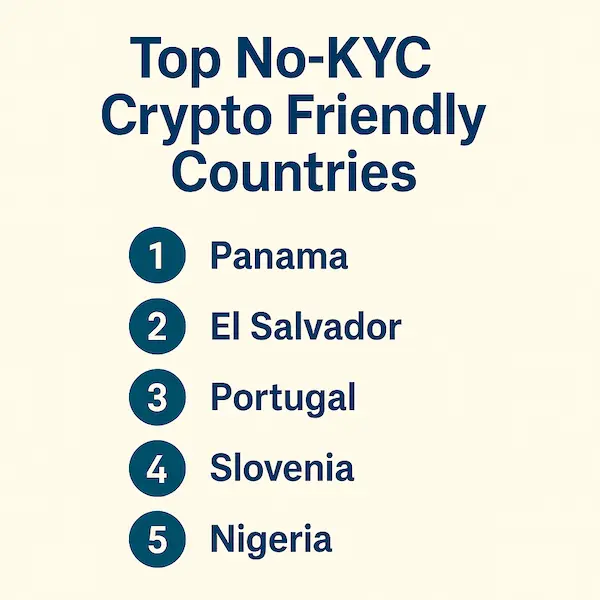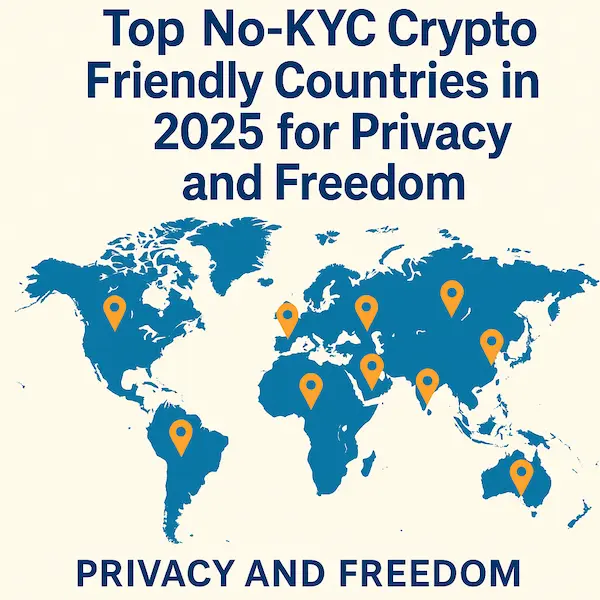Cryptocurrency adoption is rapidly evolving across the globe, and one of the most controversial aspects remains Know Your Customer (KYC) requirements. While KYC regulations help curb fraud, money laundering, and terrorist financing, they also come at the cost of privacy, speed, and access. That’s why a growing number of crypto users and businesses are seeking no-KYC crypto friendly countries where they can transact with more freedom and fewer compliance burdens.
In this guide, we explore the top jurisdictions in 2026 that are enabling KYC-free crypto payment models, offering a balanced regulatory environment, strong privacy protections, and innovation-friendly policies.
Contents
- 1 Introduction to KYC-Free Crypto Payments
- 2 Why Some Countries Are Moving Toward No-KYC Models
- 3 Legal and Ethical Considerations
- 4 Criteria for Ranking No-KYC Crypto Friendly Countries
- 5 Top 10 No-KYC Crypto Friendly Countries in 2026
- 6 No-KYC Use Cases: Who Benefits Most?
- 7 Risks and Challenges of No-KYC Jurisdictions
- 8 Why KYC-Free Crypto Payment Models Are Gaining Popularity
- 9 FAQs – Best No-KYC Crypto-Friendly Countries for Secure Business
- 10 Conclusion: The Future of No-KYC Crypto Zones
Introduction to KYC-Free Crypto Payments
KYC (Know Your Customer) refers to the mandatory process of verifying the identity of clients, typically used by banks and financial institutions. In the crypto space, KYC is increasingly enforced on centralized exchanges, DeFi platforms, and even payment gateways. However, a growing movement argues that KYC contradicts the ethos of decentralization and financial freedom.
KYC-free crypto payment models allow users to send and receive cryptocurrencies without submitting identity documents, enabling quicker onboarding, enhanced privacy, and borderless financial access.
Why Some Countries Are Moving Toward No-KYC Models
The push toward no-KYC crypto friendly countries is driven by several key factors:
- Innovation Incentives: Some jurisdictions want to attract crypto startups and fintech innovators by easing compliance burdens.
- Tourism and Nomadism: Digital nomads and freelancers seek privacy-focused financial tools that work globally.
- Unbanked Populations: In countries with large unbanked populations, KYC becomes a barrier to access.
- Regulatory Loopholes or Flexibility: Some countries haven’t yet enforced stringent KYC rules, creating space for KYC-free operations.

Legal and Ethical Considerations
While KYC-free crypto payment systems offer flexibility and privacy, they walk a legal tightrope:
- AML/CTF Compliance: Avoiding KYC can expose users or platforms to accusations of enabling money laundering.
- Jurisdictional Conflict: Using a no-KYC gateway from one country while residing in another may trigger cross-border legal scrutiny.
- User Protection: Without identity verification, fraudulent activities may go unchecked, affecting user trust.
That said, in well-regulated no-KYC zones, businesses often find creative ways to strike a balance between regulatory leniency and ethical operation.
For businesses and individuals seeking more control over their financial privacy, exploring a crypto payment gateway without KYC is a smart move. Solutions like XAIGATE’s no-KYC crypto payment platform allow seamless transactions with full anonymity and speed.
Criteria for Ranking No-KYC Crypto Friendly Countries
To compile this list, we analyzed each country based on:
- Government stance on crypto and KYC
- Availability of no-KYC exchanges or gateways
- Regulatory clarity and legal risk
- Popularity among crypto startups and digital nomads
- Tax benefits and crypto-related incentives
Let’s dive into the top jurisdictions in 2026.

Top 10 No-KYC Crypto Friendly Countries in 2026
1. Panama
Panama remains a pioneer in crypto freedom. While there is no official recognition of Bitcoin as legal tender, crypto-friendly regulations and no mandatory KYC for wallet creation or peer-to-peer payments make it highly attractive. Panamanian law allows crypto to be used for payments and tax reporting in some cases.
- Pros: No crypto tax, growing fintech ecosystem
- Cons: Some uncertainty over long-term regulation
2. El Salvador
Since legalizing Bitcoin as legal tender in 2021, El Salvador has embraced crypto innovation. While KYC is required on government platforms like Chivo, many private operations, including crypto ATMs and wallet apps, still allow no-KYC use.
- Pros: Bitcoin is legal tender, pro-crypto government
- Cons: Infrastructure still developing
3. Portugal
Although Portugal has tightened some crypto tax policies in recent years, it remains a favorite among crypto users for its relatively lenient stance. Peer-to-peer crypto transactions often avoid KYC obligations. Crypto income is tax-free for individuals under specific conditions.
- Pros: Tax perks, digital nomad-friendly
- Cons: Centralized exchanges require KYC
4. United Arab Emirates (Dubai)
Dubai is fast becoming a crypto capital. The Virtual Assets Regulatory Authority (VARA) has set clear, business-friendly rules, and there are numerous wallet providers and OTC desks that don’t require KYC for transactions under certain limits.
- Pros: Pro-business, high privacy culture
- Cons: KYC may still be enforced at larger volumes
5. Georgia
Georgia offers a liberalized financial environment. Crypto is legal, and the government does not impose KYC requirements on wallets or basic peer-to-peer exchanges. It’s also becoming a hub for mining and digital nomadism.
- Pros: No crypto taxes, low-cost living
- Cons: Smaller market, limited infrastructure
6. Marshall Islands
With its own sovereign digital currency (SOV) initiative, the Marshall Islands is experimenting with decentralization at the national level. Its regulatory approach allows room for KYC-optional systems to thrive.
- Pros: Decentralization-first policies
- Cons: Limited infrastructure for businesses
7. Saint Kitts and Nevis
A tax haven with flexible crypto laws, Saint Kitts and Nevis supports several DeFi platforms and OTC desks that operate with low or no KYC requirements. Citizenship-by-investment options attract high-net-worth crypto individuals.
- Pros: Privacy haven, zero tax on crypto
- Cons: Expensive for average users
8. Switzerland (Certain Cantons)
Switzerland overall is compliant with global financial standards, but some cantons (like Zug, the “Crypto Valley”) allow more privacy-focused operations. While exchanges require KYC, private wallets and in-person crypto businesses offer more flexibility.
- Pros: Legal clarity, advanced infrastructure
- Cons: Living cost and compliance still high
9. Hong Kong
Hong Kong is balancing regulation and innovation. Some P2P marketplaces and smaller platforms still allow crypto transactions with minimal KYC, particularly for local residents.
- Pros: Financial hub, robust legal system
- Cons: Increasing pressure from China
10. Nigeria
Despite the central bank’s past crackdowns, Nigeria has one of the fastest-growing crypto user bases. P2P transactions thrive through apps like Paxful and Binance P2P with minimal KYC friction.
- Pros: Massive adoption, unbanked population
- Cons: Regulatory conflict and enforcement risk

Comparison Table: Crypto‑Friendly Countries by KYC Requirements (2026)
| Country / Region | KYC Level | Legal/Regulatory Status | No‑KYC Use Cases | Considerations |
|---|---|---|---|---|
| Panama | Minimal | Allows crypto use; no mandatory KYC for peer-to-peer | Wallet creation and P2P trades without KYC | Tax‑free crypto environment; legal clarity evolving |
| El Salvador | Tiered / Optional | Bitcoin legal tender; private wallets may avoid KYC | ATMs and wallets like Chivo allow low‑KYC use | Infrastructure still developing; oversight improving |
| Portugal | Low‑level | Crypto tax-free in many cases for individuals | P2P trading often excludes centralized KYC | Centralized exchanges still require identity verification |
| UAE (Dubai) | Tiered | VARA-regulated; small OTC desks may operate no‑KYC under limits | Retail wallets, low-value OTC trades without full KYC | Business-level crypto services require KYC compliance |
| Switzerland | Moderate | Regulated but privacy-respecting crypto infrastructure | Decentralized trades and self-custody wallets | High compliance for service providers; cantonal variation |
| Germany / France / EU (MiCA) | High | Standardized crypto regulation and AML/KYC mandates | Small-value wallets sometimes exempt | Full-service providers require full KYC for users |
| United States / Canada | Stringent | Crypto service providers must KYC under AML legislation | Almost no non-KYC options remain | AML laws strictly enforced; exchanges register as MSBs |
No-KYC Use Cases: Who Benefits Most?
No-KYC crypto friendly countries are especially valuable to:
- Freelancers and remote workers
- Citizens of authoritarian regimes
- Digital nomads and global entrepreneurs
- Unbanked populations
- Small-scale traders and OTC users
Risks and Challenges of No-KYC Jurisdictions
While appealing, operating in or using no-KYC environments comes with several concerns:
- Legal grey zones
- Potential for scams or rug pulls
- Exchange rate volatility
- Blacklisting by international banks
As global AML rules tighten, countries with KYC leniency may face pressure from international watchdogs.
Why KYC-Free Crypto Payment Models Are Gaining Popularity
In 2026, debates over KYC-free crypto payment models have intensified. While regulators push for stricter AML (Anti-Money Laundering) policies, many countries are experimenting with light-touch or optional KYC frameworks to balance innovation with compliance. This has created favorable environments for startups, freelancers, and unbanked communities to access crypto payments without heavy identity checks.
1. Privacy as a Driving Force
Users increasingly value privacy, especially in regions with restrictive banking systems. KYC-free models give individuals greater control over their digital identity.
2. Faster Onboarding for Merchants
For small businesses, lengthy KYC checks can create barriers. KYC-free gateways allow instant onboarding, helping merchants start accepting crypto payments within minutes.
3. Access for the Unbanked
In emerging economies, millions lack access to traditional banking. KYC-free models open the door for participation in the digital economy.
4. Balancing Innovation and Regulation
Countries supporting this model often introduce “tiered KYC” systems, where small transactions require no ID but larger ones do. This keeps compliance flexible.
| Benefit of KYC-Free Models | Impact on Users | Impact on Businesses |
|---|---|---|
| Privacy & Anonymity | Protects user data | Builds trust with privacy-first users |
| Faster Onboarding | Quick wallet creation | Immediate merchant integration |
| Inclusion for the Unbanked | Financial access for millions | New customer segments |
| Flexible Compliance | Less friction for small users | Regulatory balance maintained |
FAQs – Best No-KYC Crypto-Friendly Countries for Secure Business
1. What does “no-KYC” mean in crypto payments?
No-KYC means users can send or receive crypto without submitting identity documents, making the process faster and more private.
2. Why are some countries considered no-KYC crypto-friendly?
These countries either have relaxed crypto regulations or don’t require identity verification for small or peer-to-peer transactions, allowing businesses to operate more freely.
3. Is it legal to run a no-KYC crypto business internationally?
It depends on the jurisdiction. While some countries allow no-KYC transactions under certain limits, others require full compliance with KYC/AML laws.
4. Which countries support no-KYC crypto payments in 2026?
Countries like Panama, El Salvador, UAE, Portugal, and Georgia are popular for allowing more crypto freedom and lower regulatory barriers for no-KYC operations.
5. Can I register a crypto business in a no-KYC-friendly country?
Yes. Many entrepreneurs choose to incorporate in crypto-friendly jurisdictions to benefit from lower compliance burdens, tax advantages, and operational flexibility.
6. Are no-KYC crypto platforms completely anonymous?
No. While identity checks may be skipped, responsible platforms still monitor transactions using tools like blockchain analytics to prevent abuse or fraud.
7. Do no-KYC countries still follow global financial standards?
Most do, but with more lenient enforcement or thresholds. They often require compliance only when transaction volumes cross specific limits or involve fiat conversion.
8. What are the risks of operating from a no-KYC crypto country?
Risks include future regulation changes, blacklisting, or restrictions on banking. That’s why choosing a stable, crypto-progressive country is crucial.
9. How do no-KYC countries benefit crypto startups?
They lower the entry barrier for small businesses, reduce legal friction, and attract global customers who value privacy, decentralization, and payment speed.
10. Is XAIGATE usable in no-KYC crypto-friendly countries?
Yes. XAIGATE supports businesses in many of these regions by offering non-custodial, KYC-optional crypto payments with full control and compliance flexibility.
Conclusion: The Future of No-KYC Crypto Zones
In 2026, the push and pull between financial freedom and compliance continues. No-KYC crypto friendly countries offer a glimpse into a more privacy-respecting, user-controlled future — but they’re not without risks.
For users and businesses alike, the key lies in understanding local laws, using reputable platforms, and staying updated with global crypto policy shifts.
As Web3 evolves, we may see a hybrid model emerge: one where user sovereignty coexists with smart, decentralized compliance tools.
Quick Summary Table – Top Countries Supporting KYC-Free Crypto Payment Models
| Aspect | Key Insights | Country Examples |
|---|---|---|
| Adoption | Strong growth in regions supporting no-KYC crypto use. | El Salvador (BTC Legal Tender), UAE (Dubai VARA sandbox), Nigeria (high retail adoption) |
| Benefits | Faster transactions, enhanced privacy, broader access for unbanked populations. | El Salvador (financial inclusion), Nigeria (mobile crypto payments) |
| Risks | Money laundering, scams, regulatory uncertainty remain key challenges. | Concerns flagged in UAE and Nigeria by regulators |
| Future Trend | Hybrid or tiered KYC models expected to balance risk and innovation. | UAE exploring sandbox + tiered compliance |
| Success Factor | Countries that balance innovation with AML/CTF controls will lead adoption. | El Salvador & UAE setting early frameworks |
For daily updates, subscribe to XAIGATE’s blog!
If you’re looking to integrate a compliant yet privacy-friendly payment gateway into your system, we recommend trying XAIGATE’s KYC-free crypto gateway. It’s designed for businesses that value efficiency, global access, and customer data sovereignty.
We may also be found on GitHub, and X (@mxaigate)! Follow us!
Don’t miss out on the opportunity to elevate your business with XAIGATE’s best cryptocurrency payment gateway. The three-step process is designed to be user-friendly, making it accessible for all businesses. Embrace this modern payment solution to provide customers with a secure and efficient way to pay. Take the first step towards a competitive edge in the digital realm and unlock the benefits of cryptocurrency payments for online casino today.










